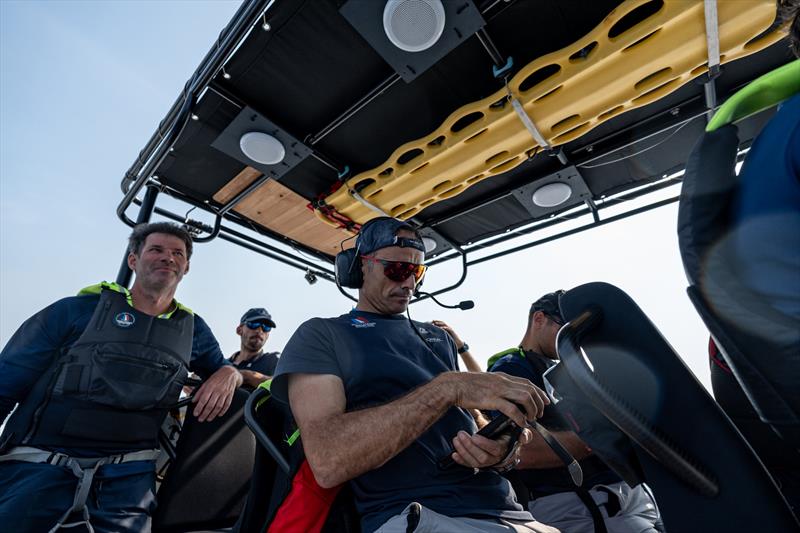
Orient Express Racing Team's Cammas and Foucher put the focus on performance data
by Orient Express Racing Team 11 Jul 2024 09:13 BST

Orient Express Racing Team © Alexander Champy-McLean / OERT
There is no clearer indication of the central role that data now plays than Orient Express Racing Team's Head of Performance Franck Cammas saying the racing sailors "have to abandon any preconceived ideas" and adopt the shared language it offers.
The America's Cup has long been recognised as being at the cutting edge of technological development in the pursuit of ultimate high performance.
While this remains the case, the ongoing explosion in the quality and quantity of raw data from the foiling AC75s and AC40s has brought other new areas of expertise front and centre in the quest for speed.
Most specifically, how to translate and harness the stream of hard data into readily usable guidance for the race crews, coaches and backroom teams.
Working alongside Cammas, data analyst Valentin Foucher is harvesting the "huge amount of data" that is transmitted ashore which details dozens of elements including everything from flight height and wind speed to acceleration and the numerous sail adjustments made in every tack and gybe.
"Franck has immeasurable experience at this level, so he knows exactly what he wants," said Foucher. "I consider that we are here to provide him with the tools and to have a quantitative approach to a whole range of subjects."
Cammas values the data as the key to unlocking performance, even beyond the race crews' considerable experience.
He explains: "First and foremost the sailors, myself and also Valentin, should know how the boat works. For example in a tack there are five or six adjustments per sail, and other actions, in a short timeline. So we have this theory on the 20 actions that are required, then we go sailing.
"I let them sail using their instincts, but with virtual reference points. And then we look at the results — heel, boatspeed, when board down, high exit or low? Whatever is faster is better.
"So we have the performance indicators, and we all have the experience, we all have a degree of knowledge that will steer us in the right direction. But in the end, to be objective, you have to abandon any preconceived ideas.
"We don't know these boats well. A feeling is important, but with all the data that is available to us we have to use it. The data enables us to confirm a feeling, or sometimes tells us to ignore it.
"Sometimes it will be a battle with the sailors who say they've got a good feeling, the helm feels smooth, etc. But just because the helm is smooth doesn't mean the boat will go fast. Maybe you have to wrestle with the boat, maybe that is when it will go its fastest.
"You really have to keep an open mind. You can't sail these boats like a dinghy where you have zero info and do everything by feeling."
And Cammas pointed to another element specific to the Orient Express Racing Team's AC75 — and the other challengers — which has pilots Quentin Delapierre and Kevin Peponnet on opposite sides of the boat.
"It could be the way that the boat should feel when it is being sailed at its optimum, so we also need to educate the sailors' feel for the boat. With their experience, with one coming from the 470, the other from the Nacra, inevitably they don't have the same 'best feeling' and there lies the complexity, because you have two pilots, one on each side.
"They will say 'I've got the best feeling with this set up', but I don't know what the best feeling signifies for him. And Quentin doesn't know what the 'best feeling' signifies for Kevin. We talk but we don't have the same language.
"The numbers give us a common language, they don't require translation, they are direct. It is excellent to have access to this level of data, it is completely objective."
The pursuit of speed will continue informed, as ever, by the data.